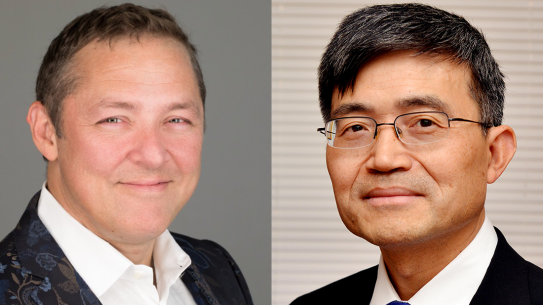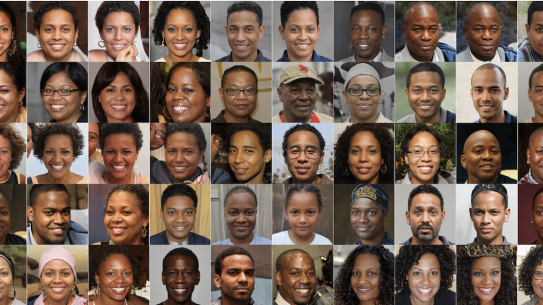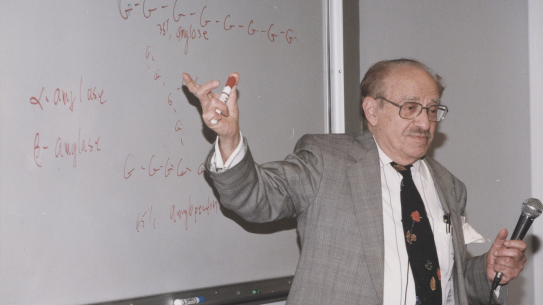New Faculty Join NYU-Poly
As classes are underway, new faces can be seen throughout Polytechnic Institute of New York University (NYU-Poly). Most belong to the entering class of 2017, more than 600 bright and eager students whose energy and enthusiasm are infectious. Some of those students will be lucky enough to study with other fresh faces: NYU-Poly's new crop of faculty members, many of whom come to us from various corners of the world and all of whom arrive with impressive lists of accomplishments on their CVs. Read more about each of them here:
Juan Pablo Bello
Juan Pablo Bello’s work will be of great interest to anyone seeking an easier way to transcribe long compositions, get better recommendations based on current musical preferences, or search through massive musical collections. An Associate Professor of Music and Music Education at Steinhardt with a cross appointment to NYU-Poly’s Department of Electrical and Computer Engineering, Bello is an expert in the field of Computer Audition, the study of computational systems that can analyze and process auditory input.
An aficionado of an eclectic variety of music, including jazz and electronic, Bello explains: “Services like Pandora and Spotify have millions and millions of tracks. You can imagine how much more efficient it is to be able to classify them according to what kinds of patterns they contain, by analyzing rhythm, structure, and other elements.” Not only would it take a human listener an inordinate amount of time to classify even a fraction of those tracks, he continued, but the process itself is somewhat subjective. “Take disco, as an example,” he says. “An American listener would classify that as 1970s music, but it didn’t hit Latin America until the ‘80s, so a listener there would place it in a different category.”
At NYU-Poly, Bello is teaching an introductory course on analyzing not only music but environmental sounds and speech. He is also working closely with the Center for Urban Science and Progress (CUSP) on a new project that involves investigating the patterns of noise complaints, which are among the most common reasons New Yorkers dial the city’s 311 help line. “We hope that the information will help officials discover how best to address the problems and enforce policy,” he says.
The recipient of a CAREER award from the National Science Foundation and a Fulbright scholar grant for multidisciplinary studies in France, Bello has found a way to combine his love of technology and the arts, and his appointment at NYU-Poly is music to our ears!
De Angela Duff
To talk to De Angela Duff--an industry associate professor in the Department of Technology, Culture and Society--is to hear about music (she has her own eclectic radio show that broadcasts online), photography (she is working on a series focused on lost shoes, a surprisingly rich source of material given the number she sees abandoned on city streets), and coding (she has developed a course-management portal that provides an alternative to Blackboard). And that’s just in the first few minutes.
Duff, who hails originally from Alabama, is here at NYU-Poly, in part, to revamp the Integrated Digital Media’s curriculum, an ambitious undertaking that involves interviewing alumni, looking at other institutions, sitting in on classes, meeting with faculty—and then reaching a consensus. “It needs to be a participatory process if it's going to be done right,” she explains.
Duff will also be teaching the required Visual Foundation Studio course and is looking forward to making social media an integral part of the class. “We’ll be using OpenProcessing.org, which allows a student to share and discuss their work in a collaborative environment. It’s a very natural way for today’s students to learn,” she says.
This marks the first time that Duff, a former resident of Philadelphia, has lived in Brooklyn. Given the borough’s cool, creative vibe, that seems like a very natural match as well.
Vittoria Flamini
As an industry assistant professor in the Department of Mechanical and Aerospace Engineering, Vittoria Flamini feels that it’s important to live up to the title. “It’s wonderful to be in the classroom, but you also have to be active in your field, making practical, real-life contributions,” she says, explaining that she serves as a member of the entrepreneurial scientific advisory panel at NYC Tech-Connect and is an active member in the ASME (founded as the American Society of Mechanical Engineers) Bioengineering Division.
Flamini’s focus is on cardiovascular biomechanics—modeling and developing minimally invasive diagnostic tools and medical devices for cardiovascular interventions. “My work allows physicians to model treatment plans and decide on the best course of actions,” she explains. “This is a translational field that has a direct impact on patient care.”
Flamini’s academic career has taken her from Rome to Dublin, and now, to New York; those other cities’ loss is undeniably our gain.
Kunil Kothari
Kunal Kothari, a visiting assistant professor in the Department of Mechanical and Aerospace Engineering, is happy to be at NYU-Poly. “I am excited by the energy of the students, and their drive for innovation,” he says. “I feel my research will attain new heights given the quality of students and faculty here.”
Kothari finished his PhD from University of Maryland, College Park in aerospace engineering with focus on manufacturing techniques for titanium based alloys and composites. He was involved in conducting research for industry as well as government agencies. Among his recent projects was a structural health monitoring system to detect fatigue damage on critical helicopter structures. He says, “One of my areas of research is smart structures, which has a lot of interesting applications for NYU-Poly’s focus on urban systems, and I’m looking forward to solving problems beyond the domain of aerospace.”
Kaan Ozbay
When the New Jersey Department of Transportation wants to study traffic control and work-zone safety for high-volume roads or the Department of Homeland Security needs to examine regional evacuation routes, those agencies call upon Kaan Ozbay, now a newly appointed professor of civil and urban engineering at NYU-Poly and at NYU’s Center for Urban Science and Progress (CUSP).
Ozbay, the founding director of the Rutgers Intelligent Transportation Systems (RITS) laboratory, focuses on the modeling and deployment of incident and emergency management operations, real-time control techniques for traffic, field evaluation of advanced ITS technology applications, application of operations research techniques in large scale transportation network optimization with an emphasis on evacuation and humanitarian logistics, transportation economics, and development of mathematical models for traffic safety and operation problems.
Citing the truly interdisciplinary nature of transportation, Professor Ozbay hopes to establish close research and education collaborations between NYU-Poly, CUSP, and other schools and departments at NYU--as well as with city agencies and other universities. He believes that using NYC as a real-life laboratory will help him and his group to develop innovative solutions to the ever-increasing transportation problems throughout the U.S. and the world.
The roads of New York City should certainly provide him with ample material!
Alessandro Rizzo
“Being in a different locale and doing your job in a different way is very enriching,” Visiting Professor of Mechanical and Aerospace Engineering Alessandro Rizzo says, “and New York City and NYU-Poly are particularly exciting places.”
Early in his career, Rizzo, a native of Catania, Italy, worked for the European Atomic Energy Community (EURATOM), researching diagnostic algorithms for nuclear fusion at JET Joint Undertaking, in the United Kingdom. Since 2005 he has been a tenured assistant professor at Politecnico di Bari (the Polytechnic University of Bari), in Italy, where he met Poly Professor Maurizio Porfiri.
For several summers, Rizzo, who can be followed on Twitter using @alerizzo_, worked with Porfiri is his Dynamical Systems Lab, and he has returned this year to teach to graduate and undergraduate classes, as well as to conduct research on bio-inspired robotics and on complex and networked systems. A Distinguished Lecturer of the IEEE Nuclear and Plasma Science Society, a Senior Member of the IEEE, and a widely published researcher, Rizzo sees being at NYU-Poly as the best of both worlds: “I’m very happy from a technical, professional point of view and also very happy from a personal, human point of view.”
Rafael Song
Unless you happen to be at NYU in Abu Dhabi, where he is based, you might not get to meet cross-appointed Assistant Professor Yong-Ak (Rafael) Song in person. Even if you never get to visit his lab, however, his work is fascinating.
Song, who was born in Korea, is working at the interface between engineering and biology to make an impact on human health. His group is developing micro- and nanofluidic “Lab-on-a-Chip” devices for ultrasensitive, high-throughput assays of various diseases.
“We are creating micro-sized channels to sort and detect cells, molecules, DNA, and proteins,” he says, explaining that if you place a drop of blood or other substance on the chip, it travels through meticulously engineered channels that separate and detect its components for point-of-care diagnostics.
Among the many advantages to the technology is the ability of performing medical tests right in the field, with no need for fully equipped—and full-sized--labs. Additionally, the biological sample required is much smaller than in traditional testing because of the extreme sensitivity of the chip. That sensitivity also means that “we can catch disease in its very early stages,” Song enthusiastically says, “and treat it more quickly and effectively.”
Working with NYU-Poly has provided him with a wonderful group of collaborators, Song says, naming Steve Arnold, Mary Cowman, Jin Kim, Kalle Levon, and Rastislav Levicky: “It demonstrates the benefits of a Global Network University.”
Oren Tapiero
The name Tapiero is a familiar one at NYU-Poly; Charles Tapiero has long been the respected head of the Department of Finance and Risk Engineering. For a portion of the 2013-14 academic year, he will be joined there by his son, Oren, whose research interests include applied information theory, regulation of financial industry and risk analysis.
The younger Tapiero has already given a well-received lecture regarding the effects on the trading process of dark pool trading, a practice that allows institutional traders to buy or sell large orders anonymously, thereby evading regulation.
When Tapiero’s time at NYU-Poly ends, he will be returning to his permanent position, at University of Paris I: Panthéon-Sorbonne. He is also affiliated with Laboratoire D’Excellence Regulation Financière, a research center dedicated to the evaluation of regulation policies.
Mina Teicher
Mina Teicher, a visiting professor in the Department of Finance and Risk Engineering, can find order in seemingly chaotic systems. “Mathematics can be applied to transportation systems, financial systems, even how our brains function,” explains Teicher, who has been active in the fields of Neuro-Mathematics and Complex Systems.
Anyone fearing that mathematics is dusty or boring need only to read Teicher’s resume. After earning her Ph.D. in mathematics from Tel Aviv University and receiving a postdoctoral fellowship from Princeton’s Institute for Advanced Study, she embarked on her tenure at Israel’s Bar-Ilan University, where she chaired the mathematics department from 1997 to 2001. That year she was made Vice President for Research at the university, a post she held until 2005, when she was appointed to a two-year term as Israel’s Chief Scientist of the Ministry of Science and Technology.
Her many other public posts have included chair of the Education Committee of the European Mathematical Society, chair of the Israeli National Council for the Advancement of Women in Science and Technology, Vice President of the International Commission for Mathematical Instruction, President of the Israel Chapter of the International Women's Forum, Vice President of the European Complex System Society, and chair of the U.S.-Israel Bi-national Science Foundation.
Many of her activities center on the advancement of young women in the sciences, and she is particularly gratified to be at NYU-Poly, with its focus on underrepresented groups and STEM education. “I also appreciate NYU-Poly’s view of the sciences as a unified way to understand the world and act upon that understanding to solve real problems,” she says.
Teicher’s CV includes professorships in Italy, Japan, Tibet, Germany, India, China, Ecuador, and New Zealand, among other far-flung locales, and we’re glad she’s adding Brooklyn to that list





